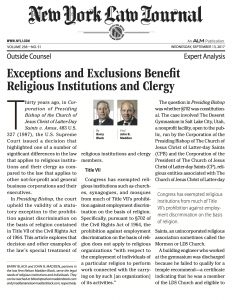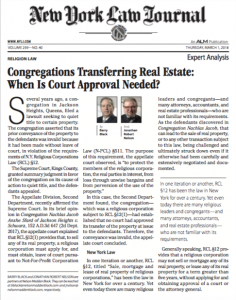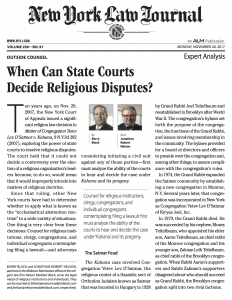Arlington, VA –  NMB partner, Jonathan Robert Nelson, delivered a two-hour webcast on the topic of “Church Law 101: Religious Institutions in a Secular Legal Environment” from the offices of the Federal Bar Association in Virginia. The webcast was part of the bar association’s program of continuing legal education for lawyers – and of our firm’s commitment to promoting wider knowledge of religious institutions law and good corporate governance for houses of worship. The
NMB partner, Jonathan Robert Nelson, delivered a two-hour webcast on the topic of “Church Law 101: Religious Institutions in a Secular Legal Environment” from the offices of the Federal Bar Association in Virginia. The webcast was part of the bar association’s program of continuing legal education for lawyers – and of our firm’s commitment to promoting wider knowledge of religious institutions law and good corporate governance for houses of worship. The
NMB Partners Author the New York Law Journal’s First Religion Law Column
The Religious Corporations Law and Religious Organizations’ Real Property Transfers
Partners Barry Black and Jonathan Robert Nelson co-authored the New York Law Journal’s inaugural Religion Law column. The article focuses on the approval necessary prior to a religious institution’s transfer of real estate as set forth in New York’s Religious Corporations Law.
This is the first article in a new quarterly series for the New York Law Journal on Religion Law. Partner Barry Black has been designated by the NYLJ as its Religion Law Columnist.
Click here to view the full text of the article,
Congregations Transferring Real Estate: When Is Court Approval Needed?
#MeToo Movement Brings Legal Issues to Religious Leadership
Issues on Sexual Harassment Surface in Religious Community
The #MeToo movement continues to gain traction nationwide, seeking to expose prevalent and persistent sexual harassment targeted mostly towards women in industries ranging from Hollywood, the national media and Corporate America. It has naturally found its way into the religious community. The Jewish community now contends with recent harassment claims by female rabbis, who are considering legal action.
The oft-blurry line between law and religion has surfaced in cases involving ministers with claims of sexual harassment. The potential impediment: the Ministerial Exception, a legal doctrine that exempts religious organizations from the reach of anti-discrimination laws. Appeals courts have differed on whether the Ministerial Exception applies to these cases. This question has yet to be fully fleshed out in the courts as more cases involving such allegations are commenced. For now, religious institutions can focus on education, policies and compliance in their efforts to create and maintain a safe, lawful and appealing work environment.
For more coverage on the issue see this article in Jewish Week, featuring comments from partner Barry Black: Click Here
NMB Decision Featured in New York Law Journal
CASE: Divya Dham Sevashram Sangha, Inc. v. Gita Temple-Ashram, Inc.
A recent decision in a case argued by Nelson Madden Black partner Jonathan Robert Nelsonwas featured in an article in the New York Law Journal’s ‘Realty Law Digest‘ (subscription required). The article notes interest in the case because of the growing number of religious institutions selling property to pay for other expenditures.
The court granted our client’s motion for summary judgment, finding that “the sale contract was void under the Religious Corporations Law and Non-Profit Corporations Law.”
NMB Partners Author Piece for New York Law Journal
The Effects a Decade-Old Decision Still has on Religion Law
Barry Blackand Jonathan Robert Nelsondelivered their insights into the power of state courts to resolve religious issues through an “expert analysis” article in the New York Law Journal.
Click here to view the full text of the article, “When Can State Courts Decide Religious Disputes?”
Parsonage Allowance: Hanging in the Balance?
What a Recent Federal Court Decision Might Mean for Clergy
On October 6, a Wisconsin federal judge ruled that the parsonage allowance authorized by Internal Revenue Code §107(2) is unconstitutional as violative of the First Amendment’s Establishment Clause. You may recall that the same judge ruled the same way back in 2013, but her decision was reversed by the Seventh Circuit Court of Appeals on standing grounds, without addressing the substantive issue of the statute’s constitutionality (full text of the decision is available here).
Judge Crabb’s ruling will again come before the Seventh Circuit. If that court upholds the decision, ministers in Wisconsin, Illinois, and Indiana would be affected. But the matter would have a good likelihood of ending up before SCOTUS and, if upheld there, the parsonage allowance would no longer be available to clergy. Please note that § 107 (1), which excludes the rental value of actual parsonages from taxable income, would remain intact – at least until that is challenged.
If parsonage allowances were to be removed from the Internal Revenue Code, clergy would be affected significantly. For some, their income could be sliced nearly in half. “Ministers,” to include clergy of all faiths and denominations, are typically not wealthy people; their focus in life is often their mission rather than personal indulgence. The humble income they derive from their work is often barely enough to get by, and further reducing it would in some instances be devastating.
Worse yet, the impact of such a change in the law would disproportionately hurt those who need more. Clergy of wealthier congregations who live in a congregation-owned home would not be affected; sadly, those serving smaller congregations with moderate financial resources, and whose compensation is far more modest, would suffer the most.
Nelson Madden Black plans to be filing an amicus brief in the Wisconsin matter, so stay tuned for updates!
Federal Judge Rules Tax-Free Housing for Clergy Unconstitutional
Ruling Could Impact Religious Leaders if Upheld
A federal judge in Wisconsin has again ruled that an Internal Revenue Code provision establishing tax-free housing allowances for clergy is unconstitutional. U.S. District Judge Barbara Crabb had decided similarly back in 2013, but the 7th U.S. Circuit Court of Appeals overturned the decision on standing grounds. The action was essentially reinitiated with the same plaintiffs after they applied to the IRS for the tax exemption and were denied, allowing them to cure the prior standing defect. This time around the 7th Circuit will be positioned to rule on the merits – the constitutionality of the IRC Section 107(2).
If upheld on appeal, this ruling could drastically impact religious leaders who avail themselves of an estimated $800 million annually in housing allowances.
Attorney General Releases Guidance on Religious Liberties
Religious Liberty Application Under Federal Law
Last Friday, the Attorney General Session issued guidance to all administrative agencies and executive departments regarding religious liberty protections in federal law. The guidance offered practical applications of several preexisting religious liberties.
NMB partner, Jonathan Robert Nelson, has encouraged courts to implement the International Religious Freedom Act, which was cited in the Attorney General’s release. NMB attorneys have also lectured about the Religious Freedom Restoration Act, another topic covered by the Attorney General.
To read the full release click here.
Partner Jonathan Nelson Selected to 2017 New York Metro Super Lawyers
Sixth Super Lawyers Selection for NMB Partner
Jonathan Nelson was selected to the 2017 edition of Super Lawyers for Business Litigation in the “New York Metro” area. This is the sixth consecutive year Mr. Nelson has been honored by the publication. Super Lawyers is a rating service of outstanding lawyers who have attained a high-degree of professional achievement. Candidates are evaluated on 12 indicators, including peer evaluation and independent research, with the final list comprised of the top 5% of lawyers in the state.
Click here to see Mr. Nelson’s profile: http://bit.ly/2yv7OjO
NMB Partners Published in the New York Law Journal
 Tax, Employment and Title VII provisions for Religious Institutions
Tax, Employment and Title VII provisions for Religious Institutions
Barry Black and John B. Madden authored an “expert analysis” article for the New York Law Journal discussing several anomalies in which the law treats religious institutions and clergy uniquely, including certain tax exemptions, employment status of clergy and Title VII provisions.


